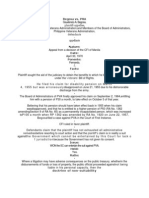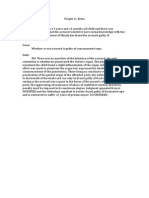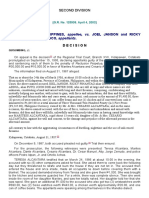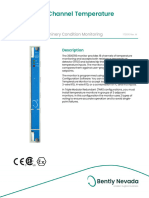Art. 16, Sec. 3 SANTOS Vs SANTOS
Art. 16, Sec. 3 SANTOS Vs SANTOS
Uploaded by
Zandra Andrea GlacitaCopyright:
Available Formats
Art. 16, Sec. 3 SANTOS Vs SANTOS
Art. 16, Sec. 3 SANTOS Vs SANTOS
Uploaded by
Zandra Andrea GlacitaOriginal Title
Copyright
Available Formats
Share this document
Did you find this document useful?
Is this content inappropriate?
Copyright:
Available Formats
Art. 16, Sec. 3 SANTOS Vs SANTOS
Art. 16, Sec. 3 SANTOS Vs SANTOS
Uploaded by
Zandra Andrea GlacitaCopyright:
Available Formats
Teodora Santos vs.
Leoncio Santos
92 Phil., 281, No. L-4699
November 26, 1952
FACTS: An undivided parcel of land was owned by the petitioners and the respondent in the
proportion of 1/7 undivided share for Teodora and 1/14 undivided share each for Josefina and
Emiliana Santos (nieces of Teodora) and 5/7 undivided share for Leoncio. Leoncio collected
from the Army of the United States of America rentals for the use and occupation of said parcel
of land.
They made a demand upon Leoncio for the accounting of which and payment of their respective
shares therein but the latter failed and refused to do so. They also complain that they made a
demand upon Leoncio to have the lot partitioned among them but the latter again refused.
Instead, he sold the lot to the Administrator of the Civil Aeronautics Administration.
Upon these allegations they pray that Leoncio be ordered to render an accounting of the rentals
and to pay and deliver their shares in the land; that the parcel of land be partitioned among them
in the proportion above stated; that the purported sale by Leoncio to the National Airports
Corporation (the predecessor of the Civil Aeronautics Administration) insofar as their shares are
concerned be declared null and void; that the Administrator of the Civil Aeronautics
Administration be directed to vacate the portions of the lot belonging to them, to pay them a
reasonable rental until after possession of their shares in the lot shall have been restored to them
and to pay damages and costs.
The Administrator of the Civil Aeronautics Administration moved to dismiss the complaint for
lack of jurisdiction and insufficiency of the complaint against him, and invoking immunity from
suit.
ISSUE: W/N the Civil Aeronautics Administration can be sued
RULING: YES. The Civil Aeronautics Administration, even if it is not a juridical entity, cannot
legally prevent a party or parties from enforcing their proprietary rights for lack of juridical
personality, because it took over all the powers and assumed all the obligations of the defunct
corporation which had entered into the contract in question.
Where the state or its government enters into a contract, through its officers or agents, in
furtherance of a legitimate aim and purpose and pursuant to constitutional legislative authority,
whereby mutual or reciprocal benefits accrue and rights and obligations arise therefrom, and if
the law granting the authority to enter into such contract does not provide for or name the officer
against whom such action may be brought in the event of a breach thereof the state itself may be
sued even without its consent, because by entering into a contract the sovereign state has
descended to the level of the citizen and its consent to be sued is implied from the very act of
entering into such contract.
You might also like
- J.P. MorganDocument17 pagesJ.P. MorganNoemi_QrzNo ratings yet
- Safety Behavior Observation Checklist: Observe Quietly. Mark Each Observation ItemDocument1 pageSafety Behavior Observation Checklist: Observe Quietly. Mark Each Observation Itemkhrayzie bhone100% (3)
- Begosa V Pva (D)Document2 pagesBegosa V Pva (D)Eunice Ignacio0% (1)
- Venn Diagram PoliciesDocument1 pageVenn Diagram Policiesapi-282032188No ratings yet
- National Airports Corp Vs TeodoroDocument2 pagesNational Airports Corp Vs Teodororodel_odz100% (1)
- Festejo VDocument4 pagesFestejo VAbegail De LeonNo ratings yet
- Lim Vs BrownwellDocument2 pagesLim Vs Brownwellgherold benitez100% (1)
- Garcia V Chief of Staff 16 Scra 120Document2 pagesGarcia V Chief of Staff 16 Scra 120Kristanne Louise YuNo ratings yet
- G.R. No. 203610, October 10, 2016Document7 pagesG.R. No. 203610, October 10, 2016Karla KatigbakNo ratings yet
- Case Digest - Gaudencio Rayo Vs Court of First Instance of Bulacan GR L-55273-83 Dec 19, 1981Document1 pageCase Digest - Gaudencio Rayo Vs Court of First Instance of Bulacan GR L-55273-83 Dec 19, 1981Lu CasNo ratings yet
- Separate Opinion, Dissenting and Concurring Justice PunoDocument48 pagesSeparate Opinion, Dissenting and Concurring Justice PunoBeethovenMarkNo ratings yet
- GR-125532-Guingona-v.-Court-of-Appeals-JUL-10-1998 182Document1 pageGR-125532-Guingona-v.-Court-of-Appeals-JUL-10-1998 182Reino CabitacNo ratings yet
- Gabriela v. Comelec J Leonen's Separate OpinionDocument12 pagesGabriela v. Comelec J Leonen's Separate OpinionMarian's PreloveNo ratings yet
- Supreme Court Decisions (Digests)Document4 pagesSupreme Court Decisions (Digests)Francis OcadoNo ratings yet
- Imbong Vs Ochoa Case DigestDocument4 pagesImbong Vs Ochoa Case DigestJazztine ArtizuelaNo ratings yet
- 35 People v. XXX, G.R. No. 240750, June 21, 2021Document11 pages35 People v. XXX, G.R. No. 240750, June 21, 2021Paolo Jericho ManuelNo ratings yet
- Bermoy Vs Phil Normal CollegeDocument1 pageBermoy Vs Phil Normal CollegeDi ko alamNo ratings yet
- Daza Vs Singson G.R. No. 86344 Case DigestDocument2 pagesDaza Vs Singson G.R. No. 86344 Case DigestLBitzNo ratings yet
- G.R. No. L-4221Document1 pageG.R. No. L-4221Teresa CardinozaNo ratings yet
- Digest People vs. Montano and CabagsangDocument2 pagesDigest People vs. Montano and CabagsangvcftellesNo ratings yet
- Villavicencio Vs Lukban 39 Phil 778Document13 pagesVillavicencio Vs Lukban 39 Phil 778LeyardNo ratings yet
- Plied To Consent When The State,: NotesDocument2 pagesPlied To Consent When The State,: NotesLouise Bolivar Dadivas0% (1)
- People vs. ManulitDocument3 pagesPeople vs. ManulitJayson MaglenteNo ratings yet
- Constantino v. MendezDocument2 pagesConstantino v. MendezJunelyn T. EllaNo ratings yet
- Lim Vs BrownellDocument11 pagesLim Vs BrownellRendall Craig RefugioNo ratings yet
- Guiyab v. PeopleDocument2 pagesGuiyab v. PeopleMarc VirtucioNo ratings yet
- Department of Education v. Oñate - 161758 - DigestDocument4 pagesDepartment of Education v. Oñate - 161758 - DigestRafNo ratings yet
- PP v. BelloDocument4 pagesPP v. Bellohukai_09No ratings yet
- University of The Philippines v. DizonDocument3 pagesUniversity of The Philippines v. DizonAtty Ed Gibson BelarminoNo ratings yet
- PP Vs BerroyaDocument10 pagesPP Vs BerroyaJohnRouenTorresMarzoNo ratings yet
- Case Digest - Yapyuco vs. Sandiganbayan and People G. R. No. 120744-46Document2 pagesCase Digest - Yapyuco vs. Sandiganbayan and People G. R. No. 120744-46Manalese, L.M.No ratings yet
- Constitution Is Defined by Malcolm AsDocument4 pagesConstitution Is Defined by Malcolm AsCD PuyatNo ratings yet
- Calalang vs. Williams, GR No. 47800, December 2, 1940Document5 pagesCalalang vs. Williams, GR No. 47800, December 2, 1940AkiNiHandiongNo ratings yet
- Bermoy v. PNC, GR No. L-8670, May 18, 1956Document1 pageBermoy v. PNC, GR No. L-8670, May 18, 1956Al Jay Mejos100% (1)
- German Agency For Technical Cooperation Vs CADocument2 pagesGerman Agency For Technical Cooperation Vs CAVirgil SawNo ratings yet
- Article 6 - People Vs ErinaDocument1 pageArticle 6 - People Vs ErinaLorelei B RecuencoNo ratings yet
- Arcega V CA - DigestDocument2 pagesArcega V CA - DigestkarenNo ratings yet
- ALMARIO VS. ALBA Case DigestDocument1 pageALMARIO VS. ALBA Case DigestSheryl OgocNo ratings yet
- CRIM 1 CASE DIGEST - CORPIN - CRL1 - JDNT-1B1 - Felonies - Part2Document11 pagesCRIM 1 CASE DIGEST - CORPIN - CRL1 - JDNT-1B1 - Felonies - Part2JemNo ratings yet
- Case-Digest-Government-v-El Monte de PiedadDocument1 pageCase-Digest-Government-v-El Monte de PiedadJohn Alex OcayNo ratings yet
- 345 Amante Roa V Insular Collector of CustomsDocument1 page345 Amante Roa V Insular Collector of CustomsCarissa CruzNo ratings yet
- Trinidad v. CADocument2 pagesTrinidad v. CAJf ManejaNo ratings yet
- Bureau of Fisheries v. COA (Digest)Document2 pagesBureau of Fisheries v. COA (Digest)Clyde Tan100% (1)
- People v. Monleon 74 SCRA 263Document7 pagesPeople v. Monleon 74 SCRA 263AnonymousNo ratings yet
- G. R. No. 143976 - April 3, 2003 FactsDocument1 pageG. R. No. 143976 - April 3, 2003 FactsJohñ Lewis FerrerNo ratings yet
- Oposa V Factoran CaseDocument5 pagesOposa V Factoran CaseJonas Cu100% (1)
- Republic V Purisima 78 SCRA 470 (1977)Document2 pagesRepublic V Purisima 78 SCRA 470 (1977)Gabriel HernandezNo ratings yet
- Sanders Vs Veridiano Case DigestDocument2 pagesSanders Vs Veridiano Case DigestKassandra Mae PinedaNo ratings yet
- B 1 7 Concept of The StateDocument7 pagesB 1 7 Concept of The Statejury jasonNo ratings yet
- Case Digest Removal From Office of ParaguasDocument2 pagesCase Digest Removal From Office of ParaguasAbeguel SebandalNo ratings yet
- Holy See VSDocument2 pagesHoly See VSMicho DiezNo ratings yet
- Capitol Medical Center vs. CA, 178 SCRA 493Document1 pageCapitol Medical Center vs. CA, 178 SCRA 493Safenaz MutilanNo ratings yet
- PEOPLE VDocument13 pagesPEOPLE VCarlos DauzNo ratings yet
- Apiag v. Cantero DigestDocument1 pageApiag v. Cantero DigestMike MarquezNo ratings yet
- Bantay Republic Act. vs. COMELEC (G.R. No. 177271)Document2 pagesBantay Republic Act. vs. COMELEC (G.R. No. 177271)Gracienne Granados CursoNo ratings yet
- Javellana v. Executive Secretary, G.R. No. L-36142, March 31, 1973Document3 pagesJavellana v. Executive Secretary, G.R. No. L-36142, March 31, 1973Hanneza Mae DualloNo ratings yet
- People Vs JansonDocument10 pagesPeople Vs JansonWilma P.No ratings yet
- Sulu Islamic Association of Masjid Lambayong vs. Judge Nabdar J. Malik A.M. No. Mtj-92-691Document1 pageSulu Islamic Association of Masjid Lambayong vs. Judge Nabdar J. Malik A.M. No. Mtj-92-691Gina FernandezNo ratings yet
- Buscayno vs. Miliary Commission, 109 SCRA 273 (Case) PDFDocument27 pagesBuscayno vs. Miliary Commission, 109 SCRA 273 (Case) PDFjomar icoNo ratings yet
- CONSTI CASES (State Immunity)Document71 pagesCONSTI CASES (State Immunity)Cherlene TanNo ratings yet
- Santos Vs SantosDocument3 pagesSantos Vs SantosEricson Sarmiento Dela CruzNo ratings yet
- Santos Vs Santos DigestDocument3 pagesSantos Vs Santos DigestAprilAngeliRobleNo ratings yet
- CASE NO. 1339 ART. XVI, SEC. 3: General Provisions Immunity From Suit Ministerio vs. CFI FactsDocument4 pagesCASE NO. 1339 ART. XVI, SEC. 3: General Provisions Immunity From Suit Ministerio vs. CFI FactsKarmela ReyesNo ratings yet
- Party-List System ReportDocument8 pagesParty-List System ReportZandra Andrea GlacitaNo ratings yet
- Li V SolimanDocument10 pagesLi V SolimanZandra Andrea GlacitaNo ratings yet
- 126 - Art 16 Sec 3 Philrock Vs Board of LiquidatorsDocument1 page126 - Art 16 Sec 3 Philrock Vs Board of LiquidatorsZandra Andrea GlacitaNo ratings yet
- 53-54 FinalDocument3 pages53-54 FinalZandra Andrea GlacitaNo ratings yet
- Batch-1-Collated RevisedDocument253 pagesBatch-1-Collated RevisedZandra Andrea GlacitaNo ratings yet
- Batch-1-Collated RevisedDocument253 pagesBatch-1-Collated RevisedZandra Andrea GlacitaNo ratings yet
- Heirs of Gamboa VS Teves 2012Document11 pagesHeirs of Gamboa VS Teves 2012Zandra Andrea Glacita100% (1)
- Report Flow NotesDocument7 pagesReport Flow NotesZandra Andrea GlacitaNo ratings yet
- People v. TabugocaDocument8 pagesPeople v. TabugocaZandra Andrea GlacitaNo ratings yet
- Media Services Contraaact CCDocument5 pagesMedia Services Contraaact CCZandra Andrea GlacitaNo ratings yet
- Marikina Auto Line Transport Corporation V People of The PhilippinesDocument2 pagesMarikina Auto Line Transport Corporation V People of The PhilippinesZandra Andrea GlacitaNo ratings yet
- Marikina Auto Line Transport Corporation V People of The PhilippinesDocument2 pagesMarikina Auto Line Transport Corporation V People of The PhilippinesZandra Andrea GlacitaNo ratings yet
- Canon 21 - A Lawyer Shall Preserve The Confidence and Secrets of His Client Even After The Attorney-Client Relation Is TerminatedDocument22 pagesCanon 21 - A Lawyer Shall Preserve The Confidence and Secrets of His Client Even After The Attorney-Client Relation Is Terminatedeomanthac100% (1)
- ABS CBN Vs NazarenoDocument9 pagesABS CBN Vs NazarenoJohn Ayson67% (3)
- STCASTDocument23 pagesSTCASTsandradimplellegaNo ratings yet
- Cambridge English Qualification (Consent Form) (1)Document3 pagesCambridge English Qualification (Consent Form) (1)2020040No ratings yet
- AckoPolicy-DBTR00000127487 00Document1 pageAckoPolicy-DBTR00000127487 00dharumamuniNo ratings yet
- Freeman Vs Reyes - Burbe Vs Magulta - Case DigestDocument4 pagesFreeman Vs Reyes - Burbe Vs Magulta - Case DigestGel DiazNo ratings yet
- Research Chapter 1-3Document14 pagesResearch Chapter 1-3Jonah DelmundoNo ratings yet
- Robert Marshall v. Douglas County Board of Education, Et Al.: Motion To Reconsider or Clarify OrderDocument15 pagesRobert Marshall v. Douglas County Board of Education, Et Al.: Motion To Reconsider or Clarify OrderMichael_Roberts2019No ratings yet
- Ugc Guidelines Visiting FacultyDocument1 pageUgc Guidelines Visiting FacultymaribardNo ratings yet
- Rahma MohamedDocument18 pagesRahma MohamedEddy MalongoNo ratings yet
- George A. Fuller Company of P.R., Inc. v. Enrique Jimenez Matta, Trustee, (In the Matter of International Mechanical Engineers and Constructors of Puerto Rico, Inc., Debtor), 370 F.2d 679, 1st Cir. (1967)Document2 pagesGeorge A. Fuller Company of P.R., Inc. v. Enrique Jimenez Matta, Trustee, (In the Matter of International Mechanical Engineers and Constructors of Puerto Rico, Inc., Debtor), 370 F.2d 679, 1st Cir. (1967)Scribd Government DocsNo ratings yet
- Ibd Top 200Document9 pagesIbd Top 200Alejandro Del CastilloNo ratings yet
- In Re: Ralph T. Byrd, Debtor, Platinum Financial Services Corporation, Roger Schlossberg, Chapter 7 Trustee, Trustee-Appellant v. Ralph T. Byrd, 357 F.3d 433, 4th Cir. (2004)Document9 pagesIn Re: Ralph T. Byrd, Debtor, Platinum Financial Services Corporation, Roger Schlossberg, Chapter 7 Trustee, Trustee-Appellant v. Ralph T. Byrd, 357 F.3d 433, 4th Cir. (2004)Scribd Government DocsNo ratings yet
- MAX BUPA Health Insurance Company LTD: Claims ManualDocument13 pagesMAX BUPA Health Insurance Company LTD: Claims Manualjkhan_724384No ratings yet
- Kamuzu Day Supplement: Tracing Kamuzu's FootstepsDocument12 pagesKamuzu Day Supplement: Tracing Kamuzu's FootstepsNation OnlineNo ratings yet
- Mayors Letter Regarding Planned ParenthoodDocument6 pagesMayors Letter Regarding Planned ParenthoodSarah Hughes100% (1)
- People of The Philippines Vs Jeric Fernandez G.R. No. 199211, June 4, 2014 "Estafa" Petitioners: RespondentDocument9 pagesPeople of The Philippines Vs Jeric Fernandez G.R. No. 199211, June 4, 2014 "Estafa" Petitioners: RespondentJoey CelesparaNo ratings yet
- Mto For Pipe Clamps and U BoltsDocument12 pagesMto For Pipe Clamps and U Boltsrp106083 PathakNo ratings yet
- Deed of Sale of Motor Vehicle With Assumption of MortgageDocument3 pagesDeed of Sale of Motor Vehicle With Assumption of MortgagePrime Antonio Ramos88% (8)
- 4 - Foundations - 11 - 26 - 2 - M4Document132 pages4 - Foundations - 11 - 26 - 2 - M4Viktor BesenyeiNo ratings yet
- Indigenous and Muslim Resistance To Spanish ColonizationDocument55 pagesIndigenous and Muslim Resistance To Spanish ColonizationRuth MayledNo ratings yet
- Nitesh Companies ActDocument10 pagesNitesh Companies ActSuraj KanchanNo ratings yet
- 8.0 Financial EstimatesDocument8 pages8.0 Financial Estimatesnur syafieraNo ratings yet
- 3500-65 16-Channel Temperature Monitor Datasheet - 172930Document8 pages3500-65 16-Channel Temperature Monitor Datasheet - 172930Kourosh52No ratings yet
- Galeni Pergamensis de TemperamentisDocument227 pagesGaleni Pergamensis de Temperamentisadeusadosol12No ratings yet
- Liftech HandoutDocument1 pageLiftech HandoutPrasanth VarrierNo ratings yet
- Asheville Police Department Unmanned Aircraft Systems PolicyDocument6 pagesAsheville Police Department Unmanned Aircraft Systems PolicyJessica WakemanNo ratings yet



































































































